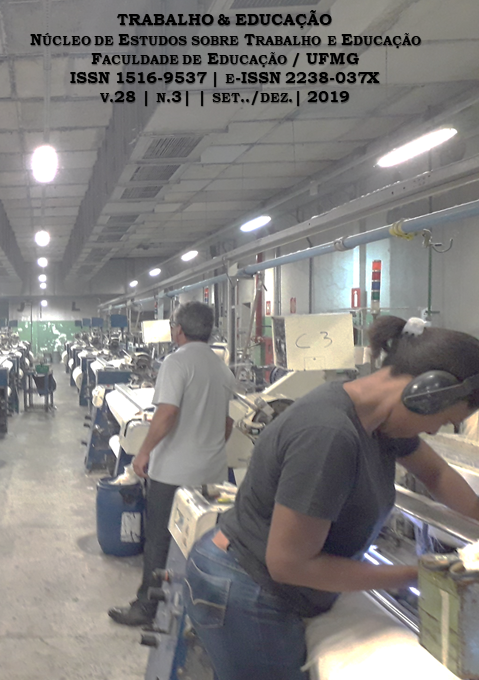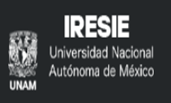Beyond mutual intelligibility
collective activity as a transaction. A contribution of pragmatism illustrated by three case
DOI:
https://doi.org/10.17648/2238-037X-trabedu-v28n3-15797Keywords:
Collective activity, Work, Experience, PragmatismAbstract
Interactions are at the center of the main sociological approaches to work. Some lines of research have been responsible for cooperative interactions that include immeasurable perspectives. But in this paper we argue that the notion of interaction needs to be extended to the notion of transaction, deeply rooted in the American pragmatic tradition. Switching from interaction to transaction allows the study of a wide range of situations without mutual intelligibility. The main feature is the coexistence of cooperation and entirely asymmetrical perspectives, not just for a transitional moment in the process of exchanging perspectives, but as a stabilized configuration. Such contexts mean coming to terms with components of long, unnoticed but increasingly current work environments. To understand these unique forms of coordination with minimal interaction, we need to consider the role of digital artifacts, third party participants, and personal rhythms. This work is based on three studies conducted in different organizational settings: a telephone traffic control center, a pediatric emergency room, and online workplace games. Where collective activity does not mean mutual intelligibility, analysis turns to the various forms of life developed in the work process, the intermittent encounters between each other's unconscious commitments and the workers confronted with their multiple spaces of activity.
References
BARAD, K. Posthumanist Performativity: toward an understanding of how matter comes to matter. Signs: Journal of Women in Culture and Society, 28. 2003.
BARBIER, J.-M., & DURAND, M. (Eds.). Sujets, activités, environnements. Approches transverses. Paris: PUF. 2006.
BECHKY, B. A.. Sharing Meaning across Occupational Communities: The Transformation of Understanding on a Production Floor. Organization Science, v. 14, n. 3. p. 312-330, 2003, Disponível em: https://econpapers.repec.org/article/inmororsc/default12.htm. Acesso em: 09 dez. 2019.
BECK, U. La société du risque. Sur la voie d’une autre modernité. Traduction de Risikogesellschaft,1 re. ed. Suhrkamp Verlag, 1986, Paris, Aubier, 2001.
BERGER, M. Répondre en citoyen ordinaire. Pour une étude ethnopragmatique des compétences profanes. Tracés, - Revue de Sciences Humaines, n.15, p.191-208, 2008 Pragmatismes. Lyon: ENS LSH. Disponível em: https://journals.openedition.org/traces/773. Acesso em: 09 dez. 2019.
BERGMAN, M. The new wave of pragmatism in communication studies. Nordicom Review. v. 29, n. 2, p. 135-153, 2007. Disponível em: https://content.sciendo.com/view/journals/nor/29/2/nor.29.issue-2.xml. Acesso em: 09 dez. 2019.
BIDET, A. L’homme et l’automate. L’écologie élargie du travail contemporain. Sociologie Du travail, v. 50, n. 3, p. 372-395, Paris, 2008 Disponível em: https://www.sciencedirect.com/journal/sociologie-dutravail/vol/50/issue/3. Acesso em: 09 dez. 2019.
BIDET, A. Qu’est-ce que le vrai boulot ? Le cas d’un groupe de techniciens. Sociétés contemporaines. v. 78, p.115-135, Paris, 2010. Disponível em: https://www.cairn.info/revue-societes-contemporaines-2010-2.htm. Acesso em: 09 dez. 2019.
BIDET, A. L’engagement dans le travail. Qu’est-ce que le vrai boulot ?, Paris, Puf, Le lien social, 416 p., 2011a.
BIDET, A. La multi-activité, ou le travail est-il encore une expérience ? Communications, 89. Paris: Éditions de l’EHESS, 9-26, 2011b.
BIDET, A. Activité. In A. Bevort, A. Jobert, M. Lallement, & A. Mias (Eds.), Dictionnaire Du travail, p. 6-12 . Paris: PUF, Quadrige. 2012.
BIDET, A., & SCHOENI, D. Décrire les présences au travail, analyser la structuration de la vie sociale. Ethnographiques.org, 23, 2011. Disponível em: http://www.ethnographiques.org/2011/. Acesso em: 19 jan. 2013.
BORZEIX, A., & COCHOY, F. Travail et théorie de l’activité: vers des « workspace studies » ? Sociologie du travail, 50, v.3, p. 273-286, 2008. https://www.em-consulte.com/article/182220/article/travail-et-theoriesde-lactivite-vers-des-. Acesso em: 09 dez. 2019.
BOUTET, M. L’ordinateur à l’état sauvage. Une approche écologique. In In: BIDET A., BORZEIX, A., PILLON, T., ROT, G., VATIN, F., (Eds), Sociologie du travail et activité. Octarès, Coll. Le travail en débats, Toulouse, p. 29-45, 2006. Disponível em: https://www.academia.edu/201953/L_ordinateur_%C3%A0_l_%C3%A9tat_sauvage._Une_approche_%C3%A9cologique. Acesso em: 09 dez. 2019.
BOUTET, M. S’orienter dans les espaces sociaux en ligne. L’exemple d’un jeu. Sociologie du travail, n. 50, v. 4, 447–470, 2008. Disponível em: https://www.sciencedirect.com/journal/sociologie-du-travail/vol/50. Acesso em: 09 dez. 2019.
BOUTET, M. Un rendez-vous parmi d’autres. Ce que le jeu sur internet nous apprend du travail contemporain. Ethnographique.org, 2011. Disponível em: http://www.ethnographiques.org/2011. Acesso em: 19, jan. 2013.
BREVIGLIERI, M. La coopération spontanée. Entraides techniques autour d’un automate public. In: CONEIN, B. & L. THEVENOT, L. (Eds.), Cognition et information en société, EHESS, Raisons pratiques, 8, Paris, 1997. Disponível em: http://editions.ehess.fr/ouvrages/ouvrage/cognition-et-informationen-societe/. Acesso em: 09 dez. 2019.
BREVIGLIERI, M. (2004). Habiter l’espace de travail. Perspectives sur la routine. Histoire & Socités, 9, 19-29. 2004. Disponível em: https://www.academia.edu/1813808/_Habiter_lespace_de_travail.-_Perspectives_sur_la_routine. Acesso em: 09 dez. 2019.
BREVIGLIERI, M. L’ épuisement capacitaire du sans-abri comme urgence ? Approche phénoménologique du soin engagé dans l’aide sociale (gestes, rythmes et tonalités d’humeur). In C. Felix, & J. Tardif (Eds.), Actes éducatifs et de soins, entre éthique et gouvernance, Nice 4-5, 2010. Disponível em: http://revel.unice.fr/symposia/actedusoin/index.html?id=795. Acesso em: 09 dez. 2019.
BREVIGLIERI, M., & STAVO-DEBAUGE, J. L’hypertrophie de l’oeil. Pour une anthropologie Du passant singulier qui s’aventure à découvert . In: CEFAI, D . & SATURNO, C. (Eds.), Itinéraires d’um pragmatiste. Autour d’Isaac Joseph, p. 79-98. Paris: Economica, 2007.
BURKE, K. Permanence and change. An Anatomy of Purpose. Berkeley: University of California Press, 1935. 1983.
CEFAI, D. (1998). Phénoménologie et sciences sociales: Alfred Schutz, naissance d'une anthropologie philosophique. Paris et Genève: Librairie Droz.
CHATEAURAYNAUD, F. Vigilance et transformation. Présence corporelle et responsabilité dans La conduite des dispositifs techniques. Réseaux, v. 85, p. 101-127. 1997. Disponível em: https://www.persee.fr/doc/reso_0751-7971_1997_num_15_85_3137. Acesso em: 09 dez. 2019.
CHAVE, F. Tiers en urgences. Les interactions de secours, de l’appel au 18 à l’accueil em service d’urgences pédiatriques. Contribution à une sociologie du tiers. Thèse de doctorat, sous La direction d’A. Borzeix. Nanterre: Université Paris Ouest-Nanterre La défense, 13 décembre 2010.
CICOUREL, A. Le raisonnement médical. Une approche sociocognitive. Paris: Seuil. 1987.
CRAGUE, G. Des lieux de travail de plus en plus variables et temporaires. Économie et statistique, n. 369, p. 191-212. 2003. Disponível em: https://www.persee.fr/issue/estat_0336-1454_2003_num_369_1?sectionId=estat_0336-1454_2003_num_369_1_7292. Acesso em: 09 dez. 2019.
CLOT, Y; ET BÉGUIN, P. L’action située dans le développement de l’activité. Activités, v.1, n. 2, p. 27-49. 2004. Disponível em: https://journals.openedition.org/activites/1179. Acesso em: 09 dez. 2019.
CRAIG, R. T. Pragmatism in the field of communication theory. Communication Theory, vol. 17, p. 125–145. https://academic.oup.com/ct/issue/17/2. Acesso em: 09 dez. 2019.
CRICK, N. Democracy & Rhetoric. John Dewey and the Arts of Becoming. Columbia: The University of South Carolina Press. 2010.
DATCHRY, C., & LICOPPE, C. La multi-activité et ses appuis. L’exemple de la présence obstinée des messages dans l’environnement de travail. Activités, n. 4, v.1, p. 4-29. Disponível em: https://journals.openedition.org/activites/1370. Acesso em: 09 dez. 2019.
DESCOMBES, V. La denrée mentale. Ed. Minuit. Paris. 1995.
DENIS, J., & PONTILLE, D.. Petite sociologie de la signalétique. Les coulisses des panneaux dumétro. Editor: Presses des Mines. Paris. 2010.
DEWEY, J. Logique. Théorie de l’enquête. Paris: PUF, 1938.
DEWEY, J. L’art comme expérience. Pau: Publications de l’Université de Pau-Farrago,1934. 2005.
DEWEY, J. 2011a. Démocratie et éducation. Suivi de Expérience et éduction. Paris: Armand Colin 1916. 2011a.
DEWEY, J. La formation des valeurs. Ed. La Découverte. Paris, 2011b - traduction et présentation par A. Bidet, L. Quéré, & G. Truc.
DODIER, N. Les hommes et les machines. La conscience collective dans les sociétés technicisées. Ed. étailié. Paris, 1995.
DOURISH, P. Where the Action Is: The Foundations of Embodied Interaction. Cambridge: Ed. MIT Press. Paris, 2001.
DREYFUS, H. Being-in-the-world. Ed. MIT Press. Cambridge,1991.
ENGESTRON, Y. Quand le centre se dérobe: la notion de knotworking et ses promesses. Sociologie du travail, nº 50, vol.3, p. 303-330. 2008. Disponível em: https://www.emconsulte.com/revue/SOCTRA/50/3/table-des-atieres/. Acesso em: 09 dez. 2019.
EMIRBAYER, M. Manifesto for a Relational Sociology. The American Journal of Sociology, n. 103, v.2, p. 281-317. Universidade de Chicago. 1997. Disponível em: https://www.journals.uchicago.edu/doi/10.1086/231209?mobileUi=0&. Acesso em: 09 dez. 2019.
FLIGSTEIN, N., & MCADAM, D. A Theory of Fields. Ed. Oxford University Press. Oxford, 2012.
GARRETA, G. Pragmatisme et pédologie. Dewey, Vygotski et la pédagogie soviétique dês années 1920. In: FRIEDRICH, J. Hofstetter, R. & SCHNEWLY, B. (Eds.), Une science du développement est-elle possible? Aspects historiques. Rennes. PUR, 2013, p. 107-138.
GOFFMAN, E. Asiles. Études sur la condition sociale des malades mentaux et autres reclus. Trad. de Liliane et Claude Lainé. Éditions de Minuit. Paris, 1979.
GOODWIN, C., & GOODWIN, M.H. Formulating Planes. Seeing as a situated activity. In: ENGESTRON,Y & MIDDLETON,D. (Eds.), Cognition and communication at work . Cambridge: Cambridge University Press. 1996, p. 61-95.
GRAFMEYER, Y., & JOSEPTH, I. L’école de Chicago. Naissance de l’écologie urbaine. Paris: Flammarion Champ. 2004.
GROSJEAN, M. L’awareness à l’épreuve des activités dans les centres de coordination. Activités, n. 2, v.1, p.76-98. 2005. Disponível em: https://journals.openedition.org/activites/632. Acesso em: 09 dez. 2019.
GROSJEAN, M., & LACOSTE, M. Communication et intelligence collective. Le travail à l’hôpital. Paris. Presses Universitaires de France, coll. Le Travail humain. 1999.
GUMPERZ, J. Engager la conversation. Introduction à la linguistique interactionnelle. Paris: Ed. Minuit. 1989.
HEATH, C., HINDMARSH, J., & LUFF, P. (Eds.) Workplace studies. New York and Cambridge: Cambridge University Press. 2000.
HENNION, A. (2009). Réflexivités. L’activité de l’amateur. Réseaux, n. 153, v.1, p. 55-78. Disponível em: https://www.cairn.info/revue-reseaux-2009-1-page-55.htm. Acesso em: 09 dez. 2019.
HOCHSCHILD, A. R. The Time Bind: When Work Becomes Home and Home Becomes Work. New York: Metropolitan Books. 1997.
HUGHES, E.C. Le regard sociologique. Essais choisis. CHAPOULIE, J-M. In: Textes rassemblés et presentes. Editions EHESS. Paris. 1996.
INGOLD, T. The Perception of Environment: Essays in Livelihood, Dwelling and Skill. London: Routledge. 2001.
JOAS, H. La créativité de l’agir. Paris: Cerf, 1992. 1999. Disponível em: https://www.unige.ch/fapse/publicationsssed/files/7714/1572/5502/Pages_de_27_THACED_INT_Baudouin.pdf. Acesso em: 09 dez. 2019.
JOSEPH, I. Attention distribuée et attention focalisée. Les protocoles de la coopération au PCC de la ligne A du RER, Sociologie du travail, n. 36, v. 4, p. 563-585. 1994. Disponível em: https://www.jstor.org/stable/i40123044. Acesso em: 09 dez. 2019.
JOSEPH, I. Pluralisme et contiguïtés. In:JOSEPH, J. & CEFAI,D. (Eds.), L’héritage Du pragmatisme. Conflits d’urbaniste et épreuves du civisme. p. 83-105. La Tour d’Aigues: Editions de l’Aube. 2002.
JOSEPH, I. L’athlète moral et l’enquêteur modeste. In: KARSENTI,B. & QUÉRÉ,L. (Eds.), La croyance et l’enquête. Aux sources du pragmatisme. Paris: EHESS, Raisons pratiques, p.19-52, 2004.
JOSEPH, I. Simmel, l’écologie urbaine et Goffman. In D. CEDAI, D. & C. SATURNO,C. (Eds .), Itinéraires d’un. Autour d’Isaac Joseph. Paris: Economica, p. 3-18, 2007.
JOSEPH, I. L’athlète moral et l’enquêteur modeste (textes réunis par D. Cefaï). Paris: Economica. 2007b.
JOSEPH, I & QUÉRÉ, L. L’organisation sociale de l’expérience. Futur antérieur, 19-20, 137- 150, 1993.
KAPTELININ, V., & NARDI, B.A. Acting with technogy. Activity theory and interaction design. Cambridge: MIT Press, 2006.
KATZ, J. How Emotions work. Chicago: The University of Chicago Press,1999.
KATZ, J. Start Here: Social Ontology and Research Strategy. Theoretical Criminology, n. 6, vol. 3, p.255-278, 2002.
KENDON, A. Conducting Interaction: Patterns of Behavior in Focused Encounters. Cambridge: Cambridge University Press. 1990.
KILPINEN, E. The Habitual Conception of Action and Social Theory. Semiotica, n. 173, v.1, p.99-128. 2009.
KNORR-CETINA, K. Sociality with Objects: Social relations in Postsocial Knowledge Societies. Theory, Culture & Society, n. 14, v. 4, p. 1-30, 1997.
KNORR-CETINA, K. Les épistémès de la société: l’enclavement du savoir dans les structures sociales. Sociologie et Sociétés, n. 30 vol. 1, p. 39-54. 1998. Disponível em: https://www.erudit.org/fr/revues/socsoc/1998-v30-n1-socsoc78/. Acesso em: 09 dez. 2019.
KNORR-CETINA, K., & Bruegger, U. La technologie habitée. La forme de vie globale dês marchés financiers. Réseaux, n. 21, v. 122, p. 111-132. 2003.
LAHLOU, S. La cognition au travail et ses outils: débordement, révolution, distribution, Les attracteurs cognitifs et le syndrome du débordement. Intellectica, n. 30, v. 1, p. 75-113. 2000.
LICOPPE, C. Logiques d’innovation, multiactivité et zapping au travail. Hermès, 50, 171-178. 2008.
MCKENZIE, R.D. The eco logical approach to the study of huamna community. In R.E. PARK, R.E, BURGESS,E.W. & T.D. MCKENZIE,T.D. (Eds), The City, 1924, p. 63-79. Chicago: University of Chicago Press.
NARDI, B., & O’Day, V. Information ecologies: Using Technologies with Heart. Cambridge: BIDET, A. et al. Au-delà de l’intelligibilité mutuelle Activités, v. 9, n. 2 190 MIT Press.1999.
NORROSS, L. Acting under Uncertainty. The Core-Task Analysis in Ecological Study of Work. Espoo: VTT. 2004.
PAGIS, M. Producing intersubjectivity in silence: an ethnographic study of meditation practice. Ethnography, v. 11, n. 2, p. 309-328. 2010.
PENEFF, J. Les malades des urgences. Paris: Métaillié. 2000.
PIETTE, A. Anthropologie existentiale. Paris: Éditions Pétra, coll. Anthropologiques, 2009a.
IETTE, A. L’acte d’exister. Une phénoménographie de la présence. Paris: Socrate Editions. 2009b.
QUÉRÉ, L. La situation toujours négligée? Réseaux. n. 85. 1997.
QUÉRÉ, L. L’environnement comme partenaire. In: BARBIER, J.M & M. DURAND. M. (Eds.), Sujets, activités, environnements. Approches transverses, Paris: PUF. 2006.
QUÉRÉ, L. & Terzi, C. Some Features of Pragmatist Thought Still Remain Insufficiently Explored in Ethnomethodology. Qualitative Sociology, n. 34, v. 1, p. 271-275. 2011. Disponível em: https://link.springer.com/article/10.1007/s11133-010-9182-9. Acesso em: 09 dez. 2019.
Rosa, H. Accélération. Une critique sociale du temps. Traduction française. Paris: La Découverte (2005). 2010.
RUSSILL, C. Through a Public Darkly: Reconstructing Pragmatist Perspectives in Communication Theory. Communication Theory, n. 18, p. 478-504. 2008.
SALEMBIER, P., & ZOUINAR, M. Intelligibilité mutuelle et contexte partagé, Inspirations conceptuelles et réductions technologiques. Activités, n. 1, v. 2, p. 64-85. 2004 http://www.activites.org/v1n2/salembier.pdf. Acesso em: 09 dez. 2019.
SCHATZKI,T.R., KNORR, C. K., SAVIGNY, V. E. The Practice Turn in Contemporary Theory. London: Routledge. 2001.
SCHMIDT, K. The trouble with ‘Tacit Knowledge’. Computer Supported Cooperative Work, nº. 21, p.163-225. 2012.
SENNETT, R. Ce que sait la main. La culture de l'artisanat. Traduction française, Paris: Albin Michel (2008). 2010.
SIMONDON, G. L’individuation psychique et collective. Paris: Aubier (1958).1989.
SIMPSON, B. Pragmatism, Mead and the Pratice Turn. Organization Studies, n. 30 v. 12, p. 1329-1347. 2009.
STRAUSS, A. La Trame de la négociation. Paris: L’Harmattan. 1992.
STRAUSS, A. Continual Permutations of Action. New Brunswick & London: TransactionPublishers. 1993.
SUCHMA, L. Human-Machine Reconfigurations. Cambridge: Cambridge University Press. 2007.













